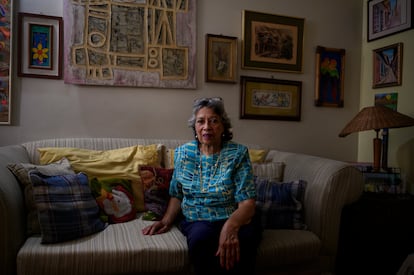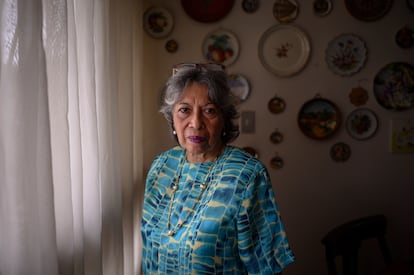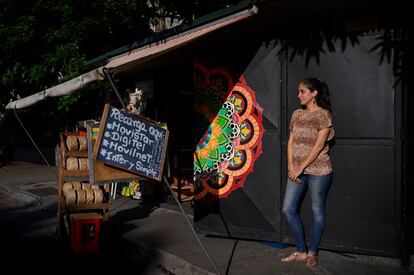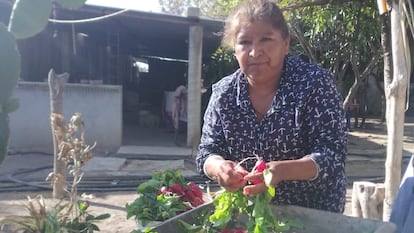The many faces behind remittances: ‘Every week I sent them money so that they could eat what we were not able to’
Behind every migrant who sends money to their family abroad lies a story of uprooting and hardship, but also of solidarity and hope

Tides of money flow around the world from rich to poor countries. In 2022, the last full year on record, remittances from migrants to their countries of origin amounted to $647 billion, according to the World Bank, which estimated $656 billion for 2023 last June. These figures showed no sign of abating during the pandemic and nor will they decrease in the coming years, according to the analyses of international organizations. From countries such as China, Mexico and Venezuela hail these four stories of renunciation, work, precariousness, perseverance and strong solidarity.

“For a long time, I was making money”
Zuleika Garcia’s daughter sends $100, medicine, hygiene and cleaning products to her family in Venezuela every month.
72-year-old Venezuelan Zuleika García, now retired after a working life devoted to education, lives with her husband — also a pensioner after five decades of work — in a middle-class apartment in Caracas. “I taught in preschools, in primary education, and I also worked in higher education, in several public and private institutes in technical careers. For a long time, I was making money,” she says. That stopped being the case a few years ago, around 2013, long before her daughter decided to leave Venezuela for Spain.
“Things were going well for her here…” She was an art professor at the Andrés Bello Catholic University and Central University of Venezuela for a long time, but the economic and social situation worsened dramatically and she ultimately left in 2020. Since then, the 175 bolivars ($8) from her retirement for three decades of service, the 130 bolivars (about $3.60) from Social Security, as well as some smaller subsidies, are supplemented by around $100, medicines and hygiene and cleaning products that her daughter sends them every month. “It’s more or less that, depending on my needs,” she explains. But it is by far her main source of revenue.

“We leave to make our careers better”
Zhou Tiantian, 30, grew up thanks to the money her father, Zhou Jun, sent from Spain to his family in Henan, central China.
Tiantian’s parents worked as civil servants in a state-owned enterprise until, like many of their compatriots, they lost their jobs during the 1998 and 2004 cuts under the new economic reform policies. Her father migrated to Alicante, Spain, in 2004, where he worked as a cook in several Asian restaurants while his wife, who was unemployed, and his daughter, then 11 years old, remained in his hometown of Zhengzhou. In the 15 years he lived in the Valencian city, he coincided with other fellow countrymen, such as Ma and Qin, who also helped their spouses and children to make ends meet in Henan.
Tiantian, who has been living in Singapore since this summer, says that adults of her generation are migrating to make their careers better, as, by and large, the Chinese population is no longer as dependent on remittances as it was at the end of the 20th century. According to the World Bank, remittances accounted for more than 0.3% of the country’s GDP in 2004, although this figure has stabilized at around 0.1% in the last five years. In 2023, the Asian powerhouse received $50 billion this way, $1 billion less than a year earlier. Jun, back in China since before the pandemic, is enjoying his retirement with his wife, while Tiantian is focused on “progressing personally and professionally.” However, her husband does “frequently” send some of the money he “saved in yuans” while working in Beijing to his parents. His parents, peasants who reside in the eastern province of Shandong, do not receive a pension.

“The money lasts a lot less”
For Diana García, who suffers from epilepsy, the income she earns from the kiosk she runs is not enough: “When I need something urgent, I ask my children,” she says.
49-year-old Diana García and her husband have been running a kiosk since 2012, after leaving her job as a high school teacher. However, in the last four years, the downturn in the Venezuelan economic situation has obliged her to ask for help from her children, who migrated to Spain, to enable her “to make ends meet.” For a time, the assistance was fixed at “$100 or $200 a month” but now it depends on her needs. “They send me money when I need something, when I ask them for something urgent.”
Diana’s children are still in the process of obtaining papers in Spain, which means their ability to earn and send money to their parents is restricted. “They mostly send medicine, since I suffer from epilepsy. The drug I take is not widely available here.” Sometimes they send money to help with unexpected expenses: “I am having the bathroom in the house repaired, and I have asked them for help to complete the payment.”
Nevertheless, their main source of income is still the establishment they run. “We’ve gradually done it up. At the beginning we were doing well, but we’ve had ups and downs,” she says. In the last five years, however, the situation has deteriorated: “[2023] has been really hard, we’ve become poorer. I used to be able to save on what I sold here, but now I don’t make enough. Sales have declined, and we’ve had to reduce our profit margins considerably to keep our prices competitive.” She says that people have stopped spending and they just purchase the essentials. And the money coming in from Spain is not enough to pay for as much as it once was: “I used to solve problems with what my daughter sent me. With $100 a month I could buy food for the house, for the dog and go to a delicatessen. What she sends me now helps me, but the money lasts a lot less.” This is the best definition of inflation at street level.

“I sent them money so that they could eat what we were not able to”
The Luna Mendoza sisters left Puebla (Mexico) 30 years ago to seek a better life in the United States. Their journey has allowed them to support their parents and children.
Migration has become a livelihood for the three Luna Mendoza sisters. They were raised in an agricultural environment among corn cobs, bean fields, radishes and pumpkins in Santa Inés Ahuatempan (Puebla). While growing up, money and food became scarce. With no opportunities to study or work in this town of less than 6,500 inhabitants, they decided to illegally cross into the U.S. in the late 1980s. The first to emigrate was the eldest, Cira Dominga. Then it was Rafaela’s turn. And in 1993 Ramona joined her sisters in California. She was 26 years old and left her two young children in the care of her parents: “It’s painful for one who leaves to try to get ahead. It’s not because you want to leave your family. It’s the necessity to leave more stability for your children and parents,” Rafaela says.
For over a decade, Ramona and her sisters worked as cleaners of luxury homes in Los Angeles, earning between $55 and $65 a day. Although there was the constant uncertainty of being deported, Ramona only thought about working to send money back to her family: “Every week I sent them $150 to $200 so that they could eat what we were not able to, so that they could have the toys that we never had.” After 13 years separated from her children, in 2007 Ramona decided to return to her roots. She was the only one to go back, because her other two sisters put down roots in the U.S. Her priority was to return to her children, who are now teenagers, to win back their affection and try to make up for the time she had not spent with them. It has not been easy, she says, but she has managed to succeed with a lot of patience: “It takes a lot of work, because it’s been 13 years of disconnecting and acting like a machine: work, more work and sending the money.”
Today, at the age of 56, she spends her days looking after her parents, who are almost 90; tending to the crops; and managing the money that her sisters continue to send on a regular basis to pay those who help Ramona in the fields and to cover her parents’ expenses. “They help a lot,” she concludes. In Santa Inés Ahuatempan, remittances are still a vital part of the economy: this year alone, the town has received almost $500,000, according to figures from the Bank of Mexico.
Sign up for our weekly newsletter to get more English-language news coverage from EL PAÍS USA Edition
Tu suscripción se está usando en otro dispositivo
¿Quieres añadir otro usuario a tu suscripción?
Si continúas leyendo en este dispositivo, no se podrá leer en el otro.
FlechaTu suscripción se está usando en otro dispositivo y solo puedes acceder a EL PAÍS desde un dispositivo a la vez.
Si quieres compartir tu cuenta, cambia tu suscripción a la modalidad Premium, así podrás añadir otro usuario. Cada uno accederá con su propia cuenta de email, lo que os permitirá personalizar vuestra experiencia en EL PAÍS.
¿Tienes una suscripción de empresa? Accede aquí para contratar más cuentas.
En el caso de no saber quién está usando tu cuenta, te recomendamos cambiar tu contraseña aquí.
Si decides continuar compartiendo tu cuenta, este mensaje se mostrará en tu dispositivo y en el de la otra persona que está usando tu cuenta de forma indefinida, afectando a tu experiencia de lectura. Puedes consultar aquí los términos y condiciones de la suscripción digital.








































